Our books

| What is EIKKA | ||
| Fields of research | ||
| General information | ||
| Our books | ||
 Magyar változat Magyar változat | ||
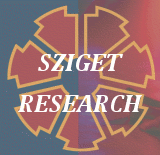
Ifjúsági korszakváltás series (ISSN 1585-8448)
The aim of Ifjúsági korszakváltás /Youth Epoch Changing/ series is to see published the latest works on youth sociology and sociography, important international studies in Hungarian, and important Hungarian studies existing in a foreign language. Its further aims are to:
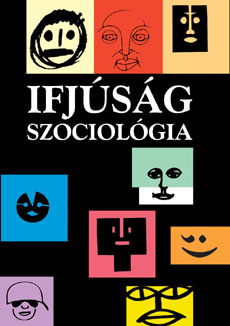 Ifjúságszociológia /Youth Sociology/ (Eds: Kálmán Gábor – Csaba Jancsák)
Ifjúságszociológia /Youth Sociology/ (Eds: Kálmán Gábor – Csaba Jancsák)
Szeged, 2006. 496 p. Contents: Kálmán Gábor: A Turn in Youth Sociology. New Starting Points. Margaret Mead (1978) Culture and Commitment. New Relationships Between Generations in the Seventies (details) Kenneth Keniston: The Non-Committed Ones. Alienated Youth in the USA. Jürgen Zinnecker: Young people in the Area of Social Classes. New Thoughts on an Old Issue. Jürgen Zinnecker: Childhood, Youth and Socio-cultural Changes in West Germany. Lynne Chisholm: A Sharper Lens, or a New Camera? Youth Research, Youth and Social Change in Great Britain. Phil Cohen: Rethinking the Problem of Youth. Meredith Watts-Jürgen Zinnecker: Youth Culture and Politics among German Youth: the Effects of Youth Centrism. Paul E. Willis: The Cultural Meaning of Drug-taking. Michael Brake: ”No future” – A Brief History of Working-class Subcultures and Styles in Great Britain. Johanna Wyn – Peter Dwyer: New Directions in Research on Transitions in Youth Life Periods. Claire Wallace – Jones Gill: Youth, Family and Becoming a Citizen. Manuela du Bois-Reymond: ’I Do Not Want to Commit Myself Yet’: Life Concepts of Youth. Fuchs, Werner: Introduction. Youth ’81. Visions of Life, Everyday Culture and a Vision of Future. Sabine. Kálmán Gábor: Epoch Changing in Youth Culture. Hungarian and German Youth in the Eighties. Kálmán Gábor: Youth Epoch Changing. Kálmán Gábor: Directions for Youth Research in the Nineties. Kálmán Gábor (1998): Social Transformation and Youth Epoch Changing. Kálmán Gábor: Basic Notions and Approaches.
Szeged, 2006. 16 p. We have been doing research on the biggest European youth festival for ten years. It contains lots of photos, and Kálmán Gábor summarises the results of the research.
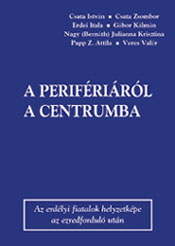 A perifériáról a centrumba. Az erdélyi fiatalok helyzetképe az ezredforduló után. /From the Margins to the Centre. The Condition of the Youth of Transylvania after the Turn of the Millennium./ (Eds: Kálmán Gábor – Valér Veres)
A perifériáról a centrumba. Az erdélyi fiatalok helyzetképe az ezredforduló után. /From the Margins to the Centre. The Condition of the Youth of Transylvania after the Turn of the Millennium./ (Eds: Kálmán Gábor – Valér Veres)
Szeged-Kolozsvár, 2005. 193 p. Contents: Kálmán Gábor: Introduction. Hypotheses on the Conditions of Hungarian Youth Living in Neighbouring Countries. Valér Veres: The Socio-structural Condition and a Vision of the Future for Transylvanian Youth. Z. Attila Papp: Using Time and Achieving at School in Hungarian Secondary-school Culture in Romania. Zsombor Csata: The Social Determination of Educational Chances among Young Transylvanian Hungarians. Itala Erdei: Student Mobility in the Carpathian Basin. István Csata: About the Values of Transylvanian Young Hungarians. Julianna Krisztina Nagy (Bernáth): Religious Faith, and What A?! Religious Faith among Transylvanian Young Hungarians in 2001. Valér Veres: Determining Factors of the National Identity of Young Transylvanian Hungarians.
Szeged, 2006. 160 p. This book is about the policy of giving and hesitating to give answers to the challenges of globalisation in ’Germany Holding’.
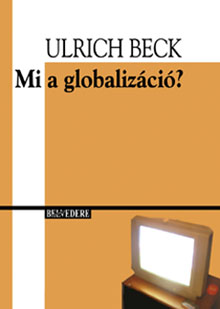 Ulrich Beck: Mi a globalizáció? /What Is Globalisation?/ Szeged, 2005. 190 p.
Dr. Ulrick Beck (1944) is Professor of Sociology at Ludwig Maximilian University of Munich at London School of Economics. Beck won the Schader Prize in Germany in 2005. This high-ranking prize is given to a social scientist every year who makes efforts both in theory and practice to solve actually existing social problems. Professor Beck discusses the latest sociological problems of globalisation, virtual taxpayers, the sovereignity of states between a world market and individualisation, the opening of a world horizon and transnational civil society; he deals with the faults of globalisation (World market metaphysics, Non-politics as a form of revolution, Black protectionism, Green protectionism, Red protectionism) and with answers given to questions raised as regards globalisation (A transnational state or ’inclusive’ sovereignity, New ways of educational policy, Ignorers of democracy, Cultural experiments, Small markets and social self-renewal) in such a way that he shows he is always aware of his own European identity.
Ulrich Beck: Mi a globalizáció? /What Is Globalisation?/ Szeged, 2005. 190 p.
Dr. Ulrick Beck (1944) is Professor of Sociology at Ludwig Maximilian University of Munich at London School of Economics. Beck won the Schader Prize in Germany in 2005. This high-ranking prize is given to a social scientist every year who makes efforts both in theory and practice to solve actually existing social problems. Professor Beck discusses the latest sociological problems of globalisation, virtual taxpayers, the sovereignity of states between a world market and individualisation, the opening of a world horizon and transnational civil society; he deals with the faults of globalisation (World market metaphysics, Non-politics as a form of revolution, Black protectionism, Green protectionism, Red protectionism) and with answers given to questions raised as regards globalisation (A transnational state or ’inclusive’ sovereignity, New ways of educational policy, Ignorers of democracy, Cultural experiments, Small markets and social self-renewal) in such a way that he shows he is always aware of his own European identity.

Szeged, 2005. 88 p. Contents: Kálmán Gábor: Island Research 2000-2004; Kálmán Gábor: Endangered Youth. Using Stress Releasing Techniques; Csaba Jancsák – István Tarnay: Festival Youth and Drugs – Graphs; Erzsébet Király: ’I cannot see the point in stopping…’ – interview
Szeged, 2004. 378 p. Contents: Mihály Csákó: Youth in a Restructuring Society; Ildikó Hrubos: Mobility in Europe; Péter Lukács: The Expansion of Higher Education; Péter Somlai: Family and Youth; Kálmán Gábor: Globalisation and Youth Epoch Changing; Olga Tóth: The Differences Between Men and Women; István Murányi: Identity and National Identity; Judit H. Sas: Imaginary Families; Ágnes H. Sas: Family Stories and Life Courses; Magda Szapu: Present Day Youth Group Cultures based on Music; Anita Horkai: Screenagers. Intercultural Communication at School; Anikó Vidra: Youths Using Space; Csaba Jancsák – Attila Matiscsák: Student Movements and the Issue of Self-Governmentalism in the '80s and the '90s; Norbert Szűcs: The Degree of Social Distance concerning Romany Youth among Secondary-school Students in Szeged.
Szeged, 2003. 54 p. This book of studies tries to give an overview about ways of communication among 15-29 year-old people. It spotlights strategic points which can be starting places for a communication system, and it analyses the computer and Internet using youth habits.
Szeged, 2002. 32 p. This is the first time that a survey of the kind had been published enriched with 55 graphs and 11 tables. It endeavours to help gain an understanding of the problems of young people living in prospering and in depressed areas, and in understanding different social phenomena.
Szeged, 2000. 294 p. This is a book version of a conference held in Budapest. It is about recent social problems (higher education, starting a career, addictions, youth crime etc.).
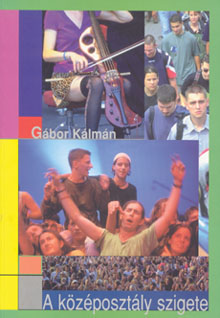 Kálmán Gábor: A középosztály szigete. /The Island of the Middle Class./
Kálmán Gábor: A középosztály szigete. /The Island of the Middle Class./
Szeged, 2000. 148 p. This richly illustrated book was published to transmit the results of the Island research (complete with its dilemmas) project to a wider range of the public. By reading the book we get to know about a new layer of young people as represented in the marketplace, who are educated, speak languages and who are connected to the information society. This layer requires a high-quality, industrialised space for culture and entertainment. Yet this change comes with many tensions and conflicts – and this is why places to talk (a drugs tent, an ’intimacy’ tent) gain in importance. The authors think that conformity does not mean a rejection of culture, as high cultural events have been embedded into the program’s structure. Furthermore, it has become a space where different people can live peacefully and have fun together.
Szeged, 2001. 148 p. The English and German version of the book A középosztály szigete.
• Publish the latest works on important youth research concerns as regards theory and methodology.
• Publish the latest studies related to youth research surveys.
• Publish interviews, studies, case studies and sociographies on students and young people with a fresh degree. We make an announcement regarding applications here every school year.
• Publish the German and English versions of the most important empirical surveys.
The series is the result of cooperation between the Research Institute of Higher Education, the Research Institute of Sociology (Hungarian Academy of Sciences) and Belvedere publishing house. The series looks at a wide range of involved persons (experts, youth politicians, university students and lecturers).
The editorial board of the series: Kálmán Gábor (president), Csaba Jancsák, Attila Matiscsák, Marianna Szemerszki, Tímea Tibori, Ágnes Utasi.
The first book of the series was published in 2000, entitled, after a conference, Social Transformation and Youth – Freedom as an Opportunity? This conference (from 1997) was the first major youth sociology event after the change of regime. There were ten topics arranged on the basis of lectures: 1. The economic condition of young persons, 2. Labour-market position – the rate of employment, 3. Education, 4. Youth culture, 5. Values, a vision of future, 6. Ethnic identity, tolerance, and intolerance, 7. Political culture, and participation, 8. Religion 9. The consumer society, lifestyles, and youth, 10. Crime.
Further Books from the Ifjúsági korszakváltás series:
• Publish the latest studies related to youth research surveys.
• Publish interviews, studies, case studies and sociographies on students and young people with a fresh degree. We make an announcement regarding applications here every school year.
• Publish the German and English versions of the most important empirical surveys.
 Ifjúságszociológia /Youth Sociology/ (Eds: Kálmán Gábor – Csaba Jancsák)
Ifjúságszociológia /Youth Sociology/ (Eds: Kálmán Gábor – Csaba Jancsák)Szeged, 2006. 496 p. Contents: Kálmán Gábor: A Turn in Youth Sociology. New Starting Points. Margaret Mead (1978) Culture and Commitment. New Relationships Between Generations in the Seventies (details) Kenneth Keniston: The Non-Committed Ones. Alienated Youth in the USA. Jürgen Zinnecker: Young people in the Area of Social Classes. New Thoughts on an Old Issue. Jürgen Zinnecker: Childhood, Youth and Socio-cultural Changes in West Germany. Lynne Chisholm: A Sharper Lens, or a New Camera? Youth Research, Youth and Social Change in Great Britain. Phil Cohen: Rethinking the Problem of Youth. Meredith Watts-Jürgen Zinnecker: Youth Culture and Politics among German Youth: the Effects of Youth Centrism. Paul E. Willis: The Cultural Meaning of Drug-taking. Michael Brake: ”No future” – A Brief History of Working-class Subcultures and Styles in Great Britain. Johanna Wyn – Peter Dwyer: New Directions in Research on Transitions in Youth Life Periods. Claire Wallace – Jones Gill: Youth, Family and Becoming a Citizen. Manuela du Bois-Reymond: ’I Do Not Want to Commit Myself Yet’: Life Concepts of Youth. Fuchs, Werner: Introduction. Youth ’81. Visions of Life, Everyday Culture and a Vision of Future. Sabine. Kálmán Gábor: Epoch Changing in Youth Culture. Hungarian and German Youth in the Eighties. Kálmán Gábor: Youth Epoch Changing. Kálmán Gábor: Directions for Youth Research in the Nineties. Kálmán Gábor (1998): Social Transformation and Youth Epoch Changing. Kálmán Gábor: Basic Notions and Approaches.

Szeged, 2006. 16 p. We have been doing research on the biggest European youth festival for ten years. It contains lots of photos, and Kálmán Gábor summarises the results of the research.

 A perifériáról a centrumba. Az erdélyi fiatalok helyzetképe az ezredforduló után. /From the Margins to the Centre. The Condition of the Youth of Transylvania after the Turn of the Millennium./ (Eds: Kálmán Gábor – Valér Veres)
A perifériáról a centrumba. Az erdélyi fiatalok helyzetképe az ezredforduló után. /From the Margins to the Centre. The Condition of the Youth of Transylvania after the Turn of the Millennium./ (Eds: Kálmán Gábor – Valér Veres)Szeged-Kolozsvár, 2005. 193 p. Contents: Kálmán Gábor: Introduction. Hypotheses on the Conditions of Hungarian Youth Living in Neighbouring Countries. Valér Veres: The Socio-structural Condition and a Vision of the Future for Transylvanian Youth. Z. Attila Papp: Using Time and Achieving at School in Hungarian Secondary-school Culture in Romania. Zsombor Csata: The Social Determination of Educational Chances among Young Transylvanian Hungarians. Itala Erdei: Student Mobility in the Carpathian Basin. István Csata: About the Values of Transylvanian Young Hungarians. Julianna Krisztina Nagy (Bernáth): Religious Faith, and What A?! Religious Faith among Transylvanian Young Hungarians in 2001. Valér Veres: Determining Factors of the National Identity of Young Transylvanian Hungarians.

Szeged, 2006. 160 p. This book is about the policy of giving and hesitating to give answers to the challenges of globalisation in ’Germany Holding’.

 Ulrich Beck: Mi a globalizáció? /What Is Globalisation?/ Szeged, 2005. 190 p.
Dr. Ulrick Beck (1944) is Professor of Sociology at Ludwig Maximilian University of Munich at London School of Economics. Beck won the Schader Prize in Germany in 2005. This high-ranking prize is given to a social scientist every year who makes efforts both in theory and practice to solve actually existing social problems. Professor Beck discusses the latest sociological problems of globalisation, virtual taxpayers, the sovereignity of states between a world market and individualisation, the opening of a world horizon and transnational civil society; he deals with the faults of globalisation (World market metaphysics, Non-politics as a form of revolution, Black protectionism, Green protectionism, Red protectionism) and with answers given to questions raised as regards globalisation (A transnational state or ’inclusive’ sovereignity, New ways of educational policy, Ignorers of democracy, Cultural experiments, Small markets and social self-renewal) in such a way that he shows he is always aware of his own European identity.
Ulrich Beck: Mi a globalizáció? /What Is Globalisation?/ Szeged, 2005. 190 p.
Dr. Ulrick Beck (1944) is Professor of Sociology at Ludwig Maximilian University of Munich at London School of Economics. Beck won the Schader Prize in Germany in 2005. This high-ranking prize is given to a social scientist every year who makes efforts both in theory and practice to solve actually existing social problems. Professor Beck discusses the latest sociological problems of globalisation, virtual taxpayers, the sovereignity of states between a world market and individualisation, the opening of a world horizon and transnational civil society; he deals with the faults of globalisation (World market metaphysics, Non-politics as a form of revolution, Black protectionism, Green protectionism, Red protectionism) and with answers given to questions raised as regards globalisation (A transnational state or ’inclusive’ sovereignity, New ways of educational policy, Ignorers of democracy, Cultural experiments, Small markets and social self-renewal) in such a way that he shows he is always aware of his own European identity.

Szeged, 2005. 88 p. Contents: Kálmán Gábor: Island Research 2000-2004; Kálmán Gábor: Endangered Youth. Using Stress Releasing Techniques; Csaba Jancsák – István Tarnay: Festival Youth and Drugs – Graphs; Erzsébet Király: ’I cannot see the point in stopping…’ – interview

Szeged, 2004. 378 p. Contents: Mihály Csákó: Youth in a Restructuring Society; Ildikó Hrubos: Mobility in Europe; Péter Lukács: The Expansion of Higher Education; Péter Somlai: Family and Youth; Kálmán Gábor: Globalisation and Youth Epoch Changing; Olga Tóth: The Differences Between Men and Women; István Murányi: Identity and National Identity; Judit H. Sas: Imaginary Families; Ágnes H. Sas: Family Stories and Life Courses; Magda Szapu: Present Day Youth Group Cultures based on Music; Anita Horkai: Screenagers. Intercultural Communication at School; Anikó Vidra: Youths Using Space; Csaba Jancsák – Attila Matiscsák: Student Movements and the Issue of Self-Governmentalism in the '80s and the '90s; Norbert Szűcs: The Degree of Social Distance concerning Romany Youth among Secondary-school Students in Szeged.

Szeged, 2003. 54 p. This book of studies tries to give an overview about ways of communication among 15-29 year-old people. It spotlights strategic points which can be starting places for a communication system, and it analyses the computer and Internet using youth habits.

Szeged, 2002. 32 p. This is the first time that a survey of the kind had been published enriched with 55 graphs and 11 tables. It endeavours to help gain an understanding of the problems of young people living in prospering and in depressed areas, and in understanding different social phenomena.

Szeged, 2000. 294 p. This is a book version of a conference held in Budapest. It is about recent social problems (higher education, starting a career, addictions, youth crime etc.).

 Kálmán Gábor: A középosztály szigete. /The Island of the Middle Class./
Kálmán Gábor: A középosztály szigete. /The Island of the Middle Class./Szeged, 2000. 148 p. This richly illustrated book was published to transmit the results of the Island research (complete with its dilemmas) project to a wider range of the public. By reading the book we get to know about a new layer of young people as represented in the marketplace, who are educated, speak languages and who are connected to the information society. This layer requires a high-quality, industrialised space for culture and entertainment. Yet this change comes with many tensions and conflicts – and this is why places to talk (a drugs tent, an ’intimacy’ tent) gain in importance. The authors think that conformity does not mean a rejection of culture, as high cultural events have been embedded into the program’s structure. Furthermore, it has become a space where different people can live peacefully and have fun together.

Szeged, 2001. 148 p. The English and German version of the book A középosztály szigete.